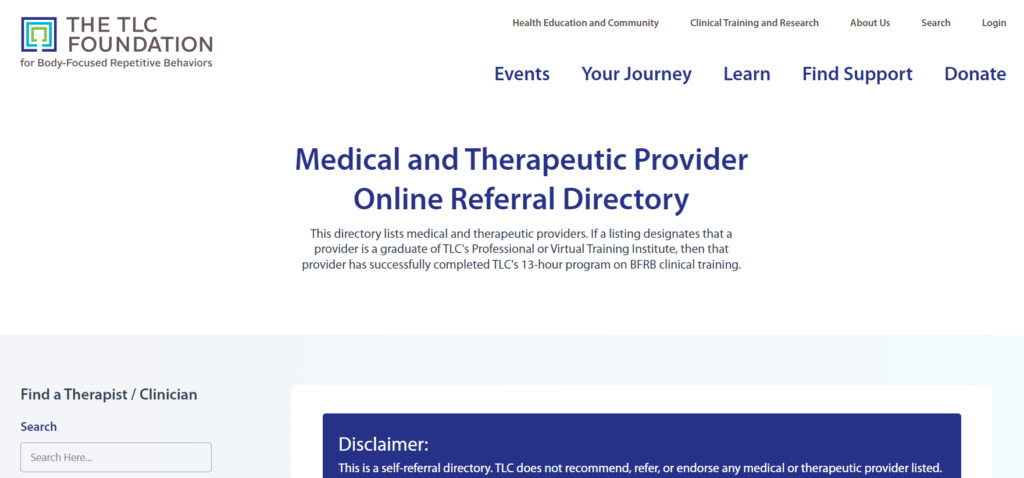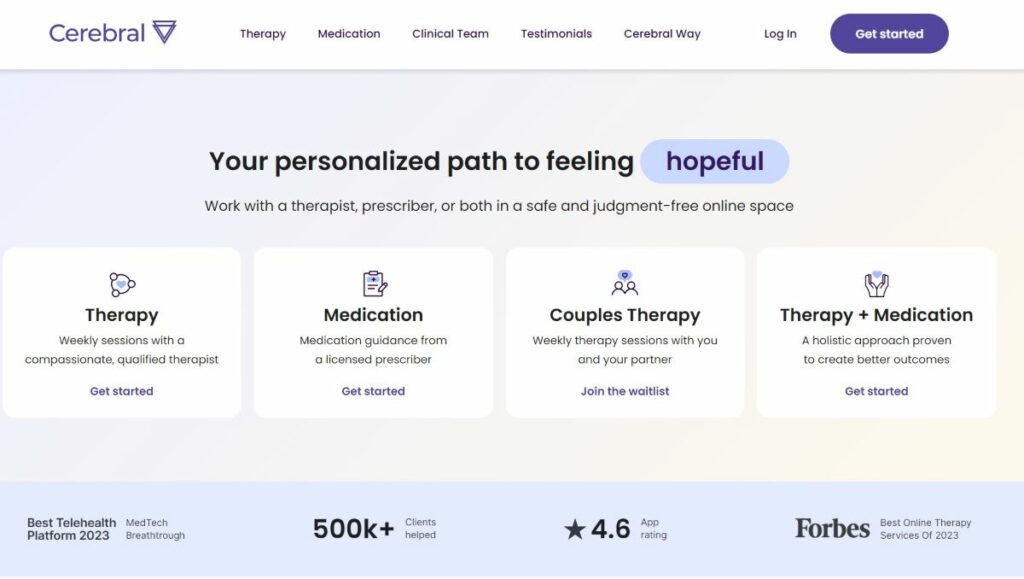Dermatillomania is a psychological condition in which you cannot resist picking your skin, even if it leads to physical pain or bleeding. A dermatillomania therapist can help you modify your skin picking behavior and alleviate your symptoms using different types of therapy.
In this article, we’ll discuss how you can find an experienced dermatillomania therapist near you or online.
Want to skip right to the suggestions for dermatillomania therapists? Here are our 6 recommended therapy solutions:
Dermatillomania Therapists Near Me
In this part, we’ve looked at six places where you can find a dermatillomania therapist. Most of these providers offer online therapy considering sometimes could be difficult to find a specialized therapist in your area.
| Providers | Good For | Location | Pricing |
|---|---|---|---|
| BetterHelp | Quick match with the right therapist four you | Online therapy | $65 to $90 per week (billed every 4 weeks) |
| Online-therapy.com | Finding licensed and experienced therapists with a Cognitive Behavioral Therapy (CBT) approach | Online therapy | $40/week to $88/week (including our 20% discount first month) |
| Calmerry | Depression therapy, online grief counseling, anxiety therapy, therapy for OCD, self-esteem therapy | Online therapy | $49.50 to $73.75 per week (billed monthly) |
| TLC Foundation Directory | Finding trerapists specilized in addressing Body-Focused Repetitive Behaviors (BFRB) | Online and in-person therapy worldwide | Varies depending on the counselor fee |
| TalkSpace | Anger management, depression, anxiety, bipolar disorder, OCD, PTSD, psychiatry | Online therapy | Varies according to insurance coverage or self-pay options |
| Cerebral | Choosing the right therapist for you | Online therapy | $74/week billed as $295/mo |
1. BetterHelp

Explore emotional well-being with BetterHelp – your partner in affordable online therapy. With 30,000+ licensed therapists and plans starting from only $65 per week, BetterHelp makes self-care accessible to all. Complete the questionnaire to match with the right therapist.
- Good for: Quick match with the right therapist four you.
- Location: Online therapy.
- Pricing: $65 to $90 per week (billed every 4 weeks).
- Features: iOS and Android app available, message your therapist anytime, live sessions are scheduled weekly and done via live chat, phone, or video call.
BetterHelp is an online platform where you can easily get in touch with qualified dermatillomania therapists who have thousands of hours of clinical experience. During the intake questionnaire, the platform will ask you some questions about the issues you’re facing, and you can explain how you’re suffering from dermatillomania.
Read our BetterHelp review here.
2. Online-therapy.com

Discover transformative online therapy with Online-therapy.com. Through cognitive behavioral therapy (CBT), Online-therapy.com offers individual and couples support starting at $45/week. Engage in sessions via video, voice, or text for maximum flexibility. Fill out their online questionnaire to get started.
- Good for: Finding licensed and experienced therapists with a Cognitive Behavioral Therapy (CBT) approach.
- Location: Online therapy.
- Pricing: $40/week to $88/week (including our 20% discount first month).
- Features: Unlimited messaging with your therapist, including a daily journal and activity plan, yoga and meditation videos, and tests to see your progress.
Online-therapy.com has a range of licensed therapists with expertise in Cognitive Behavioral Therapy (CBT), a well-known approach to addressing dermatillomania. On this platform, you will be matched with the right therapist for your needs after a short questionnaire.
Read our online-therapy.com review here.
3. Calmerry

Embark on a journey of mental wellness with Calmerry. With diverse subscription options, starting at just $50, Calmerry makes prioritizing your mental health simple and accessible. You can message your therapist any day or schedule a live therapy session from the comfort of your home from any device.
- Good for: Depression therapy, online grief counseling, anxiety therapy, therapy for OCD, self-esteem therapy.
- Location: Online therapy.
- Pricing: $49.50 to $73.75 per week (billed monthly).
- Features: Message to your counselor anytime, text therapy and video therapy according to the plan you choose, free counselor switching.
Calmerry is an online platform that provides mental health care services. Therapists on this platform have experience in addressing different issues, including dermatillomania. On this platform, you can contact your therapist via text message and call or video live sessions.
Read our comparison between Calmerry and BetterHelp here.
4. TLC Foundation Directory

- Good for: Finding trerapists specilized in addressing Body-Focused Repetitive Behaviors (BFRB).
- Location: Online and in-person therapy worldwide.
- Pricing: Varies depending on the counselor fee.
- Features: Online directory, choose your therapist and contact them directly, offers health education and community programs.
The TLC Foundation for BFRB runs an online directory on their website where you can find the contact details of dermatillomania and OCD therapists located near you. You can select different search preferences for your therapist – for example, you may need the search results to only include therapists who offer treatment to young adults or teens.
5. TalkSpace

Tailored to individuals, couples, teens, and offering psychiatry services, Talkspace plans kick off at a wallet-friendly $69 per week. What’s more, many health insurances also cover their services, enhancing accessibility and affordability. Complete a questionnaire and get matched with the right therapist for you.
- Good for: Depression, anxiety, bipolar disorder, OCD, PTSD, LGBTQIA+ therapy.
- Location: Online therapy.
- Pricing: Varies according to insurance coverage or self-pay options.
- Features: Accepts insurance, pick your therapist from a list of recommendations, live video sessions and unlimited messaging with your therapist, medication management.
TalkSpace offers mental health services through various professionals, including psychiatrists. After you complete an intake questionnaire, TalkSpace will match you with a list of dermatillomania therapists, you can browse their profiles and select one.
Read our TalkSpace review here.
6. Cerebral

- Good for: Choosing the right therapist for you.
- Location: Online therapy.
- Pricing: $74/week billed as $295/mo.
- Features: Weekly 45-minute sessions, monthly assessments, medication management.
Cerebral is an online platform that offers services such as talk therapy, medication management, and counseling for conditions like dermatillomania. The platform connects individuals with licensed therapists and mental health professionals for remote sessions.
Read our Cerebral review here.
What is Dermatillomania?
Dermatillomania, also known as excoriation disorder, is a mental health condition in which patients feel an extreme desire to pick at their skin.
Skin picking issues are classified under the spectrum of obsessive-compulsive disorders. The treatments used to manage patients with dermatillomania are often similar to those used in the management of OCD.
Symptoms of Dermatillomania
Dermatillomania is a body-focused repetitive behavior that typically presents with the following clinical symptoms:
- Repetitive skin picking, which may lead to the formation of skin lesions. Skin picking includes rubbing, recurrent touching, digging, or squeezing the skin. You may pick preformed skin lesions (like acne) or unblemished skin.
- Skin picking is compulsive, and is very difficult or impossible to stop.
- Skin picking is associated with mental stress and impaired social or occupational functioning.
- Skin picking is not associated with substance abuse disorders or other psychotic issues.
- You may use fingers, nails, and even tweezers or scissors to pick at your skin.
Sometimes, skin picking may become so intense that it can result in bleeding, bruises, or cuts.
Risk Factors for Dermatillomania

Although the exact cause of dermatillomania is still unknown, it is usually associated with other mental health conditions such as obsessive-compulsive disorder (OCD), body dysmorphic disorder, autism, and attention deficit hyperactivity disorder (ADHD).
Furthermore, dermatillomania also shows some genetic predisposition. That is why it tends to occur in families.
Triggers of Dermatillomania
Many different things can trigger dermatillomania. These factors may include, but are not limited to:
- Psychological or physical stress.
- Anxiety.
- Feelings of guilt or shame.
- Emotional imbalances.
Skin conditions like eczema, acne, dermatitis and others can also precipitate the symptoms of dermatillomania.
How Long Does Dermatillomania Last?
A skin picking disorder is typically a life-long condition; however, psychotherapy and preventable measures can reduce the chances of relapse at a later age. Most patients who follow psychotherapeutic treatments can enter a sustained remission of symptoms.
Impacts of Dermatillomania
Dermatillomania can produce many negative psychological and physical outcomes. Some of these negative impacts are mentioned below.
Psychological Impacts

Skin picking disorders can lead to depression, anxiety, guilt, shame, feelings of embarrassment, and certain other effects on your mental health. These effects may also result in decreased self-esteem and self-confidence.
Skin Infections
In dermatillomania, you may develop open wounds due to recurrent skin picking. Such wounds are prone to getting infected, and upon infection, you may develop local tissue damage, cellulitis, and other dermal manifestations.
Iron Deficiency Anemia
You may experience the symptoms of iron deficiency anemia, including fatigue, lethargy, dizziness, paleness, and light-headedness, as a result of dermatillomania. This occurs due to blood loss from the repetitive scratches or bleeding that you experience due to skin picking.
Insomnia and Loss of Energy
Dermatillomania may also result in decreased sleep or loss of energy. Sleeplessness and anhedonia (decreased energy) can occur due to an irresistible compulsion to pick at your skin. You may begin skin picking while you sleep, or when performing everyday activities, resulting in overall poor sleep, and you being distracted in your day-to-day life.
Thus, dermatillomania may reduce your overall quality of life.
When Should You Visit the ER?
Although most people with dermatillomania do not require emergency treatment, there are certain red flags that indicate active infection, sepsis, or severe anemia. In such circumstances, you should visit the ER or call 911 immediately.
These red flags may include:
- Rapid breathing or heartbeat.
- High-grade fever.
- Redness, soreness, or white discharge from scratches or skin picking wounds.
- Dizziness or confusion.
- Increased fatigue or lethargy.
How Can a Dermatillomania Therapist Help?

A dermatillomania therapist can help you alleviate your dermatillomania symptoms and prevent future skin-picking episodes.
Firstly, a therapist might ask you about your symptoms, dermatillomania triggers, risk factors, and associated diseases. Next, the therapist will evaluate the severity of your symptoms.
Then, a dermatillomania therapist will devise a therapeutic plan based on the recommended psychological therapies used for skin picking disorder, which we’ve explained in more detail below.
Your therapist may also re-evaluate your symptoms during follow-up sessions, to assess the progress of treatment.
Therapies Used for Treating Dermatillomania
Many different psychological therapies and medical treatments are available for managing the symptoms of dermatillomania. Your therapist may use the following therapies to help you resolve this skin-picking disorder.
Cognitive-Behavioral Therapy (CBT)
CBT is the most often-used therapy by dermatillomania therapists to help you cope with a skin picking disorder.
In CBT, a therapist helps to change your thoughts or ideas about this compulsive habit. This change in attitudes may result in you modifying your behavior related to skin picking.
Moreover, CBT may also help you resolve the mental health issues associated with dermatillomania, such as anxiety, depression, stress, low self-esteem, and decreased self-confidence.
As mentioned above, anxiety and stress can precipitate dermatillomania issues, while the opposite is also true – dermatillomania can result in anxiety. CBT can help break this cycle of skin picking and its associated psychological symptoms.
Acceptance and Commitment Therapy (ACT)

Acceptance and commitment therapy can help you manage dermatillomania through mindfulness and other psychotherapeutic techniques.
A therapist helps you acknowledge, pay attention to, and accept your inner thoughts and emotions during ACT. Next, the therapist may help you feel normal while experiencing negative emotions. Lastly, the dermatillomania therapist may also set achievable goals so that you remain committed to your modified behavior patterns.
In this way, you can cope with the obsession and compulsion you experience, as well as any anxiety you experience related to dermatillomania.
Habit Awareness Therapy
Habit awareness therapy is a type of behavioral therapy used to treat dermatillomania. It consists of two main phases: the habit awareness phase and the behavior modification phase.
In the first phase, a dermatillomania therapist may ask you to observe and monitor your skin picking and scratching habits, including details such as what triggers these compulsions, and when they occur.
In the second phase, the therapist may help you explore and engage in new coping strategies such as walking, gardening, use of moisturizers, and other activities designed to reverse the habit of skin picking.
Group Therapy
Group therapy is also a form of psychotherapy that can help treat dermatillomania and other body-focused repetitive behaviors.
In group therapy, a therapist will create a supportive environment where you can connect with other people facing similar issues. You can easily share your thoughts and discuss your psychological problems in such an environment, with guidance and interventions provided by your therapist.
Decoupling Therapy

Decoupling therapy is also a behavioral intervention in which a therapist can help you to avoid a negative behavior (such as skin picking), by replacing it with a counter-movement or behavior.
While treating dermatillomania, a therapist helps you learn counter behaviors such as rapid blinking, squeezing the right thumb, or closing the fist tightly. The irritation caused by these counter-movements may enable you to avoid engaging in the unwanted compulsive behavior.
Medical Interventions
In case of severe disease, your healthcare provider may prescribe you medications to control the symptoms of dermatillomania. These medications include selective serotonin reuptake inhibitors (SSRIs), Lamotrigine (anticonvulsant), and antipsychotic medications. You will need to see a psychiatrist in order to access this type of medication to control dermatillomania.
Conclusion
Dermatillomania is a mental health disorder characterized by an irresistible and compulsive desire to pick at your skin, that may require psychotherapeutic help from an experienced therapist. Dermatillomania therapists use different psychotherapies such as CBT, ACT, group therapy, and decoupling techniques to help you cope with the symptoms of dermatillomania.
Still not sure how to find the right therapist to help with dermatillomania? Feel free to contact us, and we’ll respond as soon as possible.





